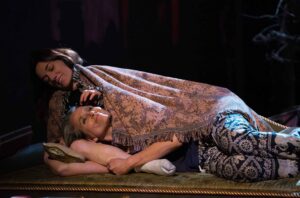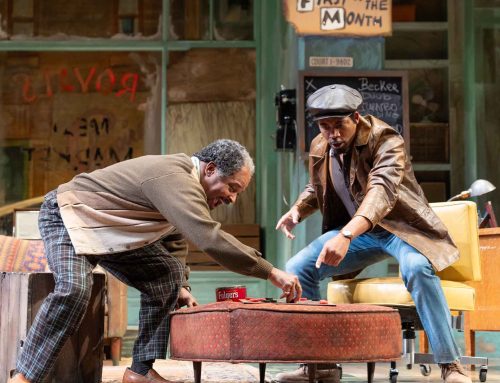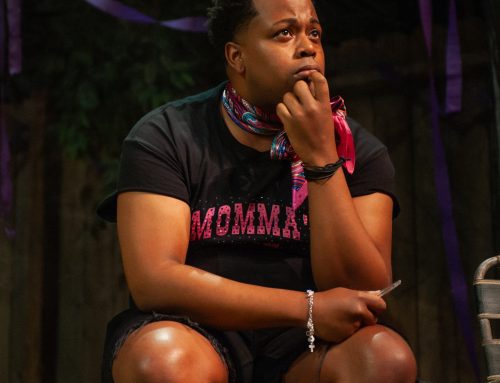unseen
written by Mona Mansour
directed by Evren Odcikin
Ashland, OR
at the Oregon Shakespeare Festival
unseen has given us hours of discussion on how we could fix it to make it a good play. We try so hard because the storyline resonates so loudly in our times of war, horror, loss, and helplessness. And we can spend hours on fixes because there are so many issues.
The title unseen itself illustrates one of the play’s problems. The e. e. cummings capitalization style is obviously supposed to mean something. So much of unseen is supposed to mean something that I didn’t quite grasp. From the title capitalization to parts of the set to passages of dialog to almost everything presented to the audience, the show is endlessly metaphorically symbolic and reminiscent of… things I should understand.
But, there’s too much I don’t understand without taking the PhD class in symbolism.
Perhaps I would spend more time trying to grok the finer points presented to us, except that the main character, Mia (played by Helen Sadler), is unlikable. Her coldness is another point of endless debate — is the character written poorly or is the problem with the actor and director in this production. Whatever the reason, we don’t wind up caring about what has happened or is happening to her.
Because we don’t bond with Mia, the string of events in her life feel random. I know what she’s lived through is PTSD provoking. But, she wasn’t warm and friendly in the earlier, pre-passing-out stressed flashback moment. So did we miss some earlier damaging scene? And, speaking of time disorientation, scenes usually started out with their time being displayed in lights on a beam on the stage, e..g, “3 months ago”. But, I think that the scenes were shown in chronological order. Weren’t they? So why display the dates?
I am fan of the rule that if you show me a gun in Act I you need to shoot it before the play is over. In unseen I never understood why Mia is a lesbian. Was it because her ex girlfriend (Derya, played by Nora el Samahy) was not out and therefore was “unseen” by much of Derya’s birth family? I don’t know. And, there were just too many loose ends for me to care about any of them.
The highlights of the short 100-minute-ish performance was the acting by el Samahy and Carolyn Shaffer who played Jane, Marian, and Nancy. These two women gave nuanced, emotional, and approachable performances. They quality of their acting was one of the reasons there was so much discussion on fixing the play… we wanted it to be worthy of their skill.
However, there’s even more to fix.
The stage design was weird with 1/3 seemingly reserved for a tree branch. There was too much movement from one side to the other making people feel like there were watching a tennis match in the aisle configuration.
Then there were the words flashed on the set telling us the time period of some of the scenes. That was okay because if you missed the date in its out-of-the-way location you generally got was going on by context. However, at the end of the play there is a prayer/song/something sung in Turkish (Arabic?) and the English translation was apparently splashed on a wall. About one in six people I talked to saw the translation, the rest of us missed the meaning of the closing words. That was a loss.
unseen has too many themes, too many possibilities, and too many symbols to be either fun or worthwhile. It’s a well-meaning piece with two fine actors, and you will discuss your ideas about how to improve it. But, overall, it’s only:
Ozdachs Rating: ![]()







Leave A Comment